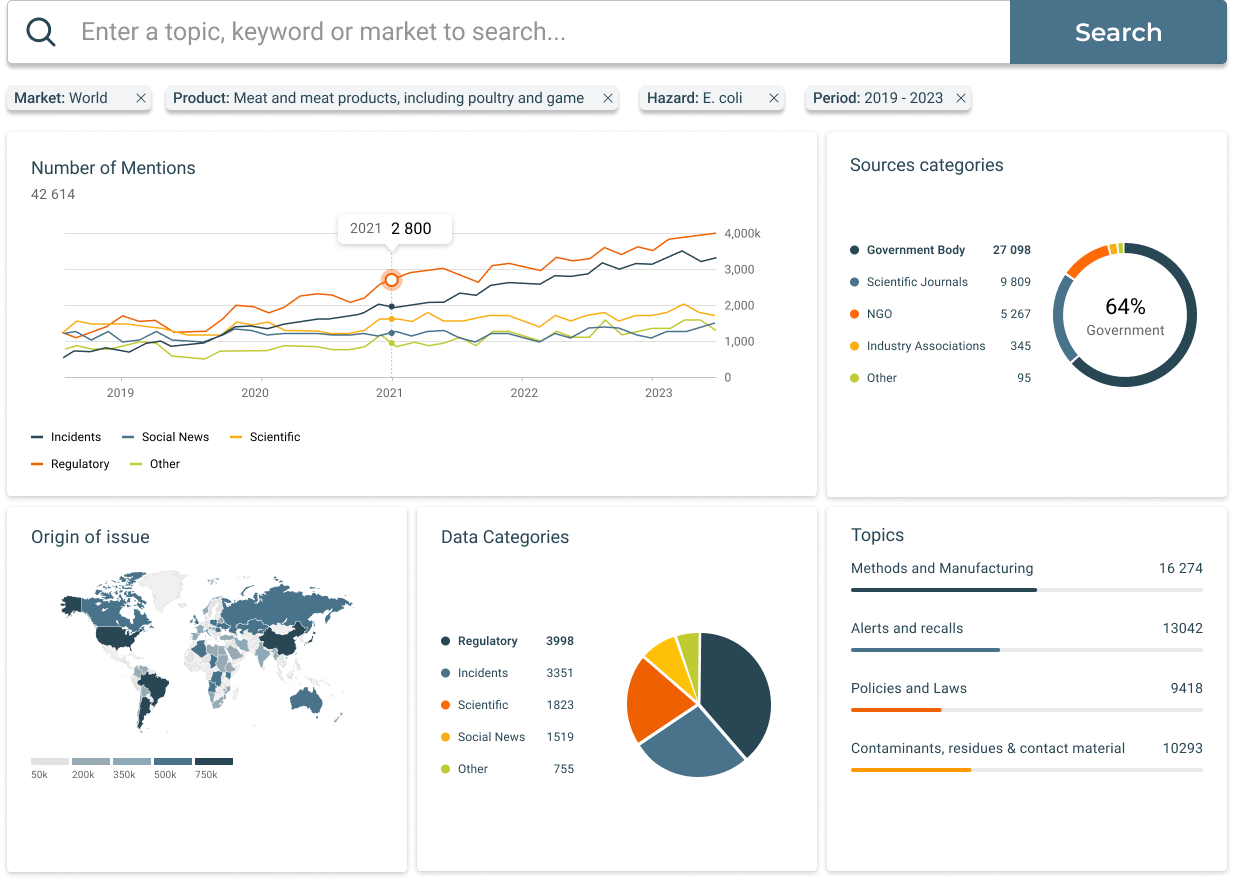In the pet food industry, ensuring the safety of products is as critical as it is in human food production. A dog food recall is a response measure taken when a product is found to be potentially harmful to pets due to contamination, mislabeling, or other hazards. As pet owners increasingly treat pets as family members, the demand for quality and safety in dog food is higher than ever. This guide explores the key aspects of dog food recalls, from causes and regulatory roles to preventive measures, offering insights for manufacturers and industry stakeholders on maintaining high standards and protecting both pets and brand reputation. Let's dive into this type of Food Recall.
What is a Dog Food Recall?
A dog food recall is the process of removing dog food products from distribution, sale, or consumption when they pose a risk to pets’ health. Recalls can be initiated voluntarily by manufacturers or mandated by regulatory authorities like the U.S. Food and Drug Administration (FDA) if the product fails to meet safety standards. Recalls may involve various types of dog food, including dry kibble, wet food, treats, or supplements, and are generally executed swiftly to limit the risk to pets.
Main Causes and Hazards of Dog Food Recalls
Several common hazards can lead to dog food recalls, each posing specific risks:
-
Microbial Contamination: Salmonella and Listeria are frequent causes of recalls in pet food. These pathogens can not only harm pets but also pose a risk to humans who handle contaminated products. Infection from these bacteria can lead to severe gastrointestinal issues, dehydration, and even death in extreme cases.
-
Chemical Contamination: Harmful chemicals, such as mycotoxins (toxins produced by mold) and aflatoxins, are sometimes present in dog food due to issues in raw material sourcing or inadequate quality controls. These toxins can cause liver damage, illness, or death in pets.
-
Nutritional Imbalance: Dog food requires a balanced composition of nutrients, including protein, fat, vitamins, and minerals. Recalls can occur when products have nutrient deficiencies or excesses, which can harm pets over time. For example, an excess of vitamin D can lead to kidney issues, while a deficiency in taurine has been linked to heart disease in dogs.
-
Foreign Objects: Sometimes, physical contaminants like metal fragments, plastic, or glass are discovered in dog food due to equipment malfunction or human error in the production process. These objects pose significant risks, as they can cause choking, internal injuries, or blockages.
-
Mislabeling: Labeling errors, particularly concerning allergenic ingredients or nutritional information, can result in a recall. For instance, if a product labeled as “grain-free” contains wheat or if an ingredient list omits potential allergens, pet owners may unknowingly expose their dogs to allergens or unbalanced diets.
Understanding these hazards is essential for manufacturers, as they directly impact product safety, regulatory compliance, and consumer trust.
Regulatory Authorities' Rights and Responsibilities in Dog Food Recalls
Regulatory bodies play a crucial role in overseeing dog food recalls and ensuring public and pet safety. In the United States, the FDA enforces regulations under the Federal Food, Drug, and Cosmetic Act (FD&C Act), which sets standards for pet food safety. The rights and responsibilities of regulatory authorities in dog food recalls include:
-
Risk Assessment and Classification: Authorities assess the severity of the risk and classify the recall according to potential harm, with Class I recalls posing the highest risk and requiring immediate action.
-
Inspection and Investigation: Regulatory bodies are empowered to investigate reported issues, inspect manufacturing facilities, and collect samples to confirm hazards. This step is essential for identifying the root cause and determining if additional products are affected.
-
Mandating Recalls: If a company does not act voluntarily, regulatory agencies have the authority to enforce recalls to protect public health and prevent the distribution of hazardous products.
-
Public Communication: Agencies issue recall notices, press releases, and updates to inform pet owners and retailers about affected products. Clear communication ensures that consumers can identify and avoid hazardous products.
-
Guidance and Support: To assist manufacturers in recall procedures, regulatory bodies provide guidance on best practices and compliance with safety standards, fostering better industry practices.
These actions by regulatory authorities help create a transparent recall process, minimizing risks to pets and upholding the integrity of the pet food industry.
Impact of Dog Food Recalls on Manufacturers
The consequences of a dog food recall can be profound for manufacturers, affecting multiple aspects of business:
-
Financial Loss: Recalls lead to direct costs related to removing products from shelves, conducting investigations, and implementing corrective actions. Indirect costs, such as lost sales, market share, and brand reputation damage, can also be significant.
-
Reputational Impact: Pet owners are particularly sensitive to the quality and safety of products, given the emotional bond they share with their pets. A recall can lead to loss of consumer trust, which may take years to rebuild. Public perception of the brand may suffer, impacting long-term loyalty.
-
Legal and Regulatory Scrutiny: Non-compliance with safety standards can lead to fines, lawsuits, and increased monitoring from regulatory agencies. Manufacturers may also face lawsuits from affected pet owners, further impacting financial stability.
-
Supply Chain Disruption: A recall disrupts supply chain operations, affecting relationships with suppliers, distributors, and retailers. Manufacturers may need to renegotiate terms, address delays, and manage strained partnerships resulting from the recall process.
Effectively managing a recall and taking steps to prevent future incidents is crucial for manufacturers to mitigate these impacts.
What Happens to Recalled Products
Once a recall is initiated, manufacturers must handle the affected products responsibly. The options include:
-
Destruction: If the recalled products cannot be made safe, they are destroyed through incineration or other methods that comply with environmental regulations, ensuring they don’t re-enter the market.
-
Reprocessing: In cases where contamination can be safely removed, products may be reprocessed and tested to ensure they meet safety standards before redistribution. This option is often more cost-effective but requires strict quality control.
-
Alternative Use or Donation: For products that may be safe for other purposes, manufacturers might consider downgrading them for non-pet uses or donating to animal shelters, subject to regulatory approval. However, this option is less common and must be carefully assessed for safety.
Handling recalled products in an ethical and responsible way protects consumer trust, meets regulatory standards, and prevents further health risks.
Preventive Measures for Dog Food Recalls
Preventing dog food recalls is essential for protecting both pets and a company’s reputation. Key preventive measures include:
-
Quality Control and Testing: Rigorous quality control measures and routine testing at all stages of production help detect and eliminate contaminants, ensuring the safety and consistency of products.
-
Supplier Verification: Working with trusted, verified suppliers and conducting audits on raw materials reduces the risk of contamination from unsafe ingredients.
-
Accurate Labeling and Transparency: Properly managing labels, particularly allergen declarations and ingredient lists, minimizes the risk of mislabeling-related recalls.
-
Regular Audits and Compliance Checks: Routine internal audits and third-party compliance checks help maintain high standards and can identify potential issues before they escalate.
-
Staff Training and Awareness: Educating employees on food safety best practices and recall protocols empowers them to detect and address potential risks proactively.
By adopting these preventive measures, manufacturers can reduce the likelihood of recalls, safeguarding both pets and their brand reputation.
Last Month's Food Recalls and Safety Incidents
Explore the latest food recalls, market withdrawals, and safety alerts in our free Food Safety Incidents Dashboard. Updated monthly and powered by SGS Digicomply, this dashboard provides a clear, filterable list of last month’s global food recalls and incidents, allowing you to stay informed on the products and hazards affecting the industry.

How manufacturers and companies can track and utilize global recall data:
SGS Digicomply continuously monitors and analyzes millions of data sources across over 160 jurisdictions. With easy-to-use filters for sources, locations, products, substances, hazards, and more, our platform allows manufacturers to track recall trends and gain actionable insights powered by AI-Copilot.
Explore our interactive demos to see these tools in action.

By combining diverse data sources, SGS Digicomply offers the most comprehensive and targeted screening of food safety data, contextualized with real-time lab data to identify emerging risks.





.webp?width=1644&height=1254&name=Food%20Safety%20Dashboard%201%20(1).webp)
